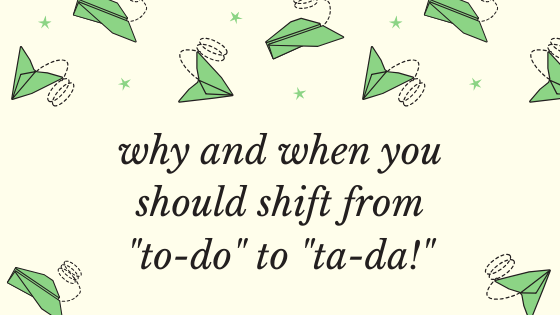When I say “I’m proud of myself!” I feel incredible. More often than not, feeling proud of myself is linked to checking off my to-do list.
While I’ve discussed at length the benefits I’ve found from using the Must-Do Method to differentiate potential to-do tasks from absolute must-do tasks, I haven’t yet acknowledged the complications that come from obsessing over a to-do list.
What are the Pitfalls of the To-do Obsession?
A to-do list (or a must-do list) can be a powerful tool for focusing attention, tracking progress, and giving ourselves permission to take the rest of the day off after a work session well spent. However, when we allow our to-do lists to dictate our self worth based on checkmarks, we lose out.
Since I am most effective when I have external accountability (I’m an Obliger on the Gretchen Rubin Four Tendencies scale), I scaffold my day with Todoist, an app that allows me to theme and flag to-dos and syncs between my phone, laptop, and even the display on my watch face. The perk here is that I can easily access the number of tasks left to accomplish each day, but the downfall is that I’m constantly being reminded of a list of incompletes. On the days when I don’t fully accomplish my to-do list, it might be due to accidentally overscheduling myself, pain or sickness flare ups, or honestly just some general ennui. Sometimes I have to postpone my to-dos to another day, and even though I try hard to accept this necessity, sometimes I feel like I “failed” because there’s some items left unchecked.
How To-dos Affect Self Esteem
Self esteem is a psychological term that “describe[s] a person’s overall sense of self-worth or personal value. In other words, how much you appreciate and like yourself.”
I struggle with low self esteem when I feel like I am undeserving of something I want. Sometimes thoughts like this trigger somatic grief that I feel in my chest, throat, and down my arms into my fingers; sometimes they lead to dissociation, negative self talk, and black and white thinking about my own worth and value. Over the last few years I have worked on adapting mindfulness techniques that help me to notice and name negative feelings early on and intentionally choose to shift my mindset. But sometimes I need a specific reminder of my worth outside my productivity. That’s when I reach for the ta-da list.
The Ta-da List
Being a productivity researcher and fanatic, I tend to work on many goals at once, and while accomplishing particular work tasks makes me feel great, I want to be proud of myself outside of my productivity, earnings, and my resume. One way I’ve been able to flex my self esteem outside of my productivity is through adapting the practice of the “ta-da list” as a gesture of self-affirmation that celebrates personal successes that are rooted in my values and passions.
At its essence, a ta-da list is a to-do list in reverse. Instead of writing down tasks you plan to accomplish and then checking off tasks as you accomplish them, a ta-da list is for noting every task that you have accomplished. You can track things throughout the day as you accomplish them, or you can write your ta-da list as a journal activity at the end of a day, week, month, quarter, or year.
I usually write my ta-da lists by topic, noting all the things that I accomplished around a particular theme. I also acknowledge the act of trying new things as something to be proud of. I recently heard this practice worded very well by my friend Casey Steele, who reminded me to value the meaningful effort I put into tasks, versus simply focusing on achievement.
I use ta-da lists in a number of ways:
- To remember what tasks I have completed already when I feel overwhelmed or confused about a project I’m working on.
- To remind myself of how far I’ve progressed on particular goals since a start date.
- To acknowledge and respect invisible labors that I may have ignored or undervalued.
- To remember how I have supported and valued time spent with my loved ones.
- And, perhaps most important, to track my progress on personal goals, particularly in order to give myself permission to celebrate and/or to rest.

Today’s takeaway is a free downloadable ta-da list worksheet you can use to track your own accomplishments.
You can customize the guide by time frame and by topic. Your topics may be work tasks like writing or teaching, but I encourage you to explore topics outside of traditional work, like personal relationships, finances, boundaries, self-care, or creativity.
Click here to download the free ta-da list worksheet!
Newsletter
Sign up below to access my free newsletter, Tending with Dr. Kate Henry.

